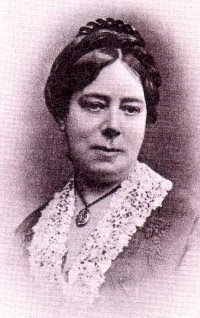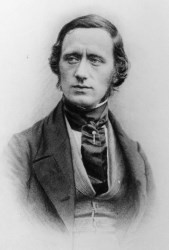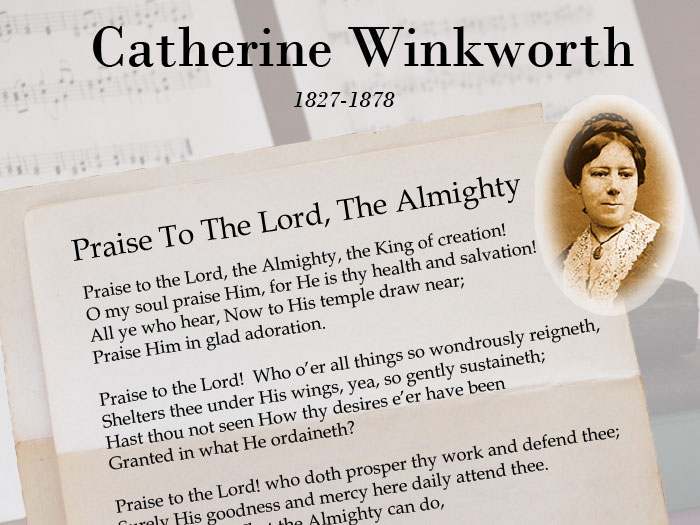Catherine Winkworth
Catherine Winkworth (* September 13 1827 in Holborn, London, † July 1, 1878 in Geneva ) was an English translator. She is best known for her performance to have the German chorale tradition native English speakers brought home by her numerous translations of hymns.
Life
Catherine Winkworth was the fourth daughter of Henry Winkworth, a silk merchant. Winkworth lived for most of her life in Manchester. She studied at the Unitarian clergyman Rev. William Gaskell and the English philosopher Dr. James Martineau. Her sister Susanna Winkworth (1820-1884) was also a translator, mostly of German devotional books.
Catherine Winkworth spent a year in Dresden, at this time, her interest developed in the German hymn. In 1854 she published her book Lyra Germanica, a collection of her selected hymns that she had translated into English. Another collection followed. 1863 she published The Chorale Book for England, which was mitverlegt of the composer William Sterndale Bennett and Otto Goldschmidt 1858. 1869 followed her book Christian Singers of Germany. The Harvard University Hymn Book According accomplished Winkworth " more than any other single person to make it accessible to the rich heritage of German hymn heritage of the English-speaking world. " Four examples of translations from her hand are published in The Church Hymn Book 1872 (No. 344, 431, 664 and 807).
In addition to the translation of hymns Winkworth was deeply involved in the struggle for women's rights; she was managing director of the Clifton Association for Higher Education for Women, advocate of Clifton High School for Girls, where a house was named after her, and a member of the Cheltenham Ladies' College. She was also Director of the Red Maids ' School in Westbury-on -Trym, Bristol.
Catherine Winkworth died suddenly near Geneva to a heart condition. She was buried in Monnetier in Upper Savoy. A monument to her was erected in the Bristol Cathedral. Your thought is on 7 August in the calendar of saints of the Episcopal Church of the United States of America as a poet songs, along with the hymn writer John Mason Neale, as in the calendar of saints of the Evangelical Lutheran Church in America, there on July 1.
Works
- Lyra Germanica: The Christian Year. London 1861 ( full text )
- Come, Holy Ghost, God and Lord ( sealed for The Church Hymn Book, 1872)
- Ever would I fain be reading (translated from German in 1858 Luise Hensel's text of 1829)
- Holy Spirit! once again (translated from German Joachim Neander 1858 Text of 1680 )
- If Jesus be my friend (translated in 1855 from Paul Gerhardt text If God is for me, so kick of 1650 )
- Lift up your heads, ye mighty gates (translated in 1853 from Georg Weissels text power up the door of 1635 )
- Deck thyself my soul with gladness (translated in 1858 from Johann Franck's text Deck thyself, O dear soul of 1646-53, revised by Winkworth, 1863, was in this form input in numerous Lutheran, Anglican and Methodist hymnals )
- Jerusalem, Thou City Fair and High ( translated in 1858 from Johann Matthäus Meyfarts Jerusalem, the highly built city of 1626 )
- O dearest Jesus, what law hast thou broken? (translated in 1863 from Johann Heermann's text heart Dearest Jesus, what have you done wrong by 1630)
- A spotless rose (translated from the first two stanzas of Es ist ein Ros sprung from the 16th century, four-part sets in 1919 by Herbert Howells and 2002 by Philip Ledger )
- Now thank we all our God (translated from Martin Rinck Arts Text Now all of 1630, giving thanks to God )
Humor: peccavi
The (1993 ) According to the Encyclopedia of Britain by Bamber Gascoigne, it was she who, referring relentless on General Charles James Napier, unauthorized and successful campaign of conquest in the Indian province of Sindh, " ... their teachers towards noting that Napier's report to the Governor General of India should be: peccavi ( Latin for ' I have sinned ', English: ' I have sinned ', in English homophonic with ' I have Sind ', ' I have Sind ') She sent her pun on the humorous magazine Punch. which reprinted it as a factual account abroad part. as a result, this joke was usually attributed to Napier. "










